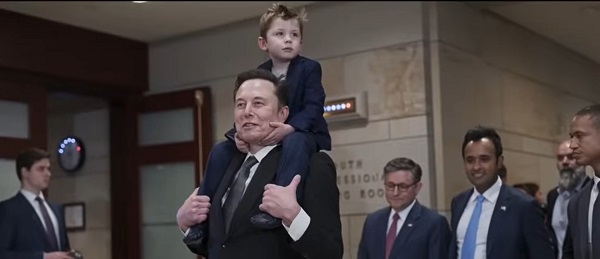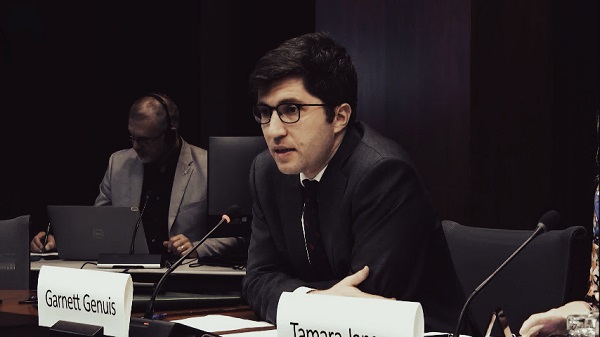Business
DOGE Must Focus On Big Picture To Achieve Big Change


From the Daily Caller News Foundation
By Jenny Beth Martin
President-elect Donald Trump’s new Department of Government Efficiency (DOGE) is wasting no time in laying the groundwork for its effort to cut the size and scope of government. That Elon Musk and Vivek Ramaswamy are the right men to lead this effort is beyond doubt — Musk famously slashed the workforce at Twitter after he bought it and Ramaswamy made shrinking the federal workforce the centerpiece of his campaign for president a year ago.
They know how to find cost savings, and they have shown they are not afraid to do so.
Visiting with congressional Republicans last week, Musk and Ramaswamy even declared they would be keeping a “naughty and nice” list of those who work with them to save taxpayer money and those who do not.
To that end — because who, especially at this time of year, doesn’t want to be on a “nice” list? — here are some thoughts.
First, they are going to have to look at the big picture. They won’t find the $2 trillion Musk pledged to save by focusing on the old standby, “waste, fraud, and abuse.” Yes, they are certainly going to find plenty of waste, fraud, and abuse in the Government Accountability Office (GAO) reports their staff will review, but that will not be enough.
To find the big savings, they are going to have to shrink not just the size of the federal government, but its scope. The federal government is not huge just because it spends money inefficiently, it is huge because it is doing things it has no business doing.
Second, they are going to have to take advantage of the fact that much of that huge government was never specifically authorized by the Congress. The federal behemoth was created by the mass of alphabet soup executive branch agencies that have for decades been imposing regulations that have the force of law, even though the Congress never approved them.
Reversing that is going to require taking a chain saw to federal regulations. And we will need a proportionally reduced federal workforce to match the reduced federal regulatory regime. That should not be a problem; huge numbers of federal employees still have not come back to work in their offices, even though the COVID-19 crisis ended years ago. The DOGE should recommend that any federal employee who refuses a directive to come back to work in the office should be terminated. That will save taxpayer money, too — a 10% cut in the federal workforce would yield about $40 billion in savings every year.
Third, recognize that to make permanent change, executive orders will not be enough — because executive orders can be reversed by the next president. Laws, on the other hand, can only be overturned with new action by the Congress and the president. That makes laws tougher to overturn.
One of the legislative changes that would serve the long-term interest in getting the federal government under control would be passage of the REINS Act, a proposed law that would require any federal agency that wanted to impose a new regulation that would have a significant impact on the economy to first gain approval from Congress in the form of an affirmative vote in both houses, and then the signature of the president. As I said when discussing this on my recent podcast with American Commitment’s Phil Kerpen, ‘Imagine that — Congress votes on something before it becomes law!”
A second legislative change that could help make a major difference would be reform of the civil service laws that govern the federal workforce. Musk and Ramaswamy are going to recommend significant elimination of positions in the federal workforce. Under the current system, it is significantly more difficult to remove employees than it is in the private sector — even employees who engage in insubordination or flagrantly breaking rules. And before you retort, “but the tradeoff they agree to, and that we must honor, is that civil service employees accept lower compensation in exchange for that greater job security,” a recent analysis by the Cato Institute shows that “the average federal civilian worker made $157,000 in wages and benefits in 2023, much higher than the average U.S. private sector wages and benefits of $94,000.”
Greater job security on top of higher compensation? That wasn’t the deal.
Rep. Barry Loudermilk (R-Ga.) introduced his MERIT Act in the last Congress. It was a proposed law that would have strengthened agency management’s power to remove poor employees, expedited timelines and made other reforms to bring the system closer to the private-sector model. Something along those lines could be extremely helpful as federal managers move to meet their reduced workforce needs.
The DOGE enterprise begins with broad public support — a recent poll conducted by McLaughlin & Associates for the organization I lead, Tea Party Patriots Action, shows that 71% of Americans support the creation of DOGE and 65% support firing government employees who do not return to their offices to work.
Musk and Ramaswamy have taken on a huge task, and they recognize the opportunity before them. By focusing on big-picture efforts to shrink the size and the scope of the federal government, they can help restore it to its constitutional moorings, with government officials in a smaller, less intrusive, less expensive government that is more responsive to the needs, desires, and authority of the citizens on whose behalf and in whose name they toil.
Jenny Beth Martin is honorary chairman of Tea Party Patriots Action.
Automotive
Parliament Forces Liberals to Release Stellantis Contracts After $15-Billion Gamble Blows Up In Taxpayer Faces

After betting taxpayer billions on a green-industry deal that collapsed under U.S. tariffs, MPs move to expose what Ottawa promised Stellantis and what Canadians actually got for the money.
Parliament just blew the lid off one of the biggest corporate giveaways in Canadian history.
For years, Ottawa and Queen’s Park have bragged about “historic investments” in green manufacturing. What they didn’t say is that $15 billion of your money went to Stellantis, the Dutch auto conglomerate behind Chrysler, Jeep, and Ram, only for the company to announce it’s cutting 3,000 jobs in Brampton and shipping them south to the United States.
That betrayal is what triggered a heated meeting of the House of Commons Government Operations Committee on October 21. What started as routine procedure turned into a full-scale reckoning over how billions were handed to a foreign corporation with almost no strings attached.
Conservative MP Garnett Genuis opened with a blunt motion: produce every contract, memorandum of understanding, or side deal the government signed with Stellantis and its affiliates since 2015. Every page, every clause, in both official languages, “without redaction.” The demand wasn’t symbolic, it was about finding out if Trudeau’s government ever required the company to keep those Canadian jobs it was paid to “protect.”
Liberals scrambled to block it. MP Jenna Sudds proposed an amendment that would let bureaucrats black out whatever they deemed “sensitive.” In practice, that meant hiding anything embarrassing — from cabinet discussions to corporate fine print. Opposition MPs called it exactly what it was: a cover-up clause. It failed.
The committee floor turned into open warfare. The Bloc Québécois tried a softer sub-amendment giving the House Law Clerk power to vet redactions. Conservatives countered with their own version forcing departments to hand over unredacted contracts and justify any blackouts in writing. After a suspension and some backroom wrangling, a rare thing happened: compromise.
The motion passed unanimously. Even the Liberals couldn’t vote against it once the light was on.
The debate itself revealed how badly Ottawa has lost control of its own economic agenda. Conservatives pressed officials on why Canadians were paying billions for “job creation” only to see Stellantis pack up for Illinois once U.S. tariffs came down. Liberals blamed Trump, tariffs, and “global conditions,” the excuses were almost comical. Liberal members blamed Donald Trump —yes, really— for Stellantis abandoning Canada. According to them, Trump’s tariffs and “America First” trade policy scared the company into moving production south.
But here’s what they didn’t say: Trump announced his 2024 presidential campaign on November 15, 2022, promising to rip up Joe Biden’s green industrial agenda and bring manufacturing back to U.S. soil. Everyone heard it. Everyone knew it. And yet, on July 6, 2023, more than half a year later, Ottawa proudly unveiled its $15-billion subsidy for Stellantis and LG Energy Solution — a deal built entirely on the assumption that Trump wouldn’t win.
So let’s be clear about what happened here. They didn’t just hand billions to a foreign automaker. They gambled that the next U.S. president wouldn’t change course. They bet the house —your tax dollars— on a political outcome in another country.
Think about that. Fifteen billion dollars of public money wagered on a campaign prediction. They bet on black, and it landed on red.
Even if the gamble had gone their way — even if Trump had lost and Biden’s green subsidy regime had survived untouched — the deal would still have been a terrible bargain.
During the committee meeting, the Bloc Québécois pointed to the 2023 Parliamentary Budget Officer’s report, which projected that the combined federal and Ontario subsidies to Stellantis and Volkswagen, roughly $28 billion total, including Stellantis’s $15 billion share, wouldn’t even break even for twenty years. That means taxpayers would have to wait until the mid-2040s just to recover what Ottawa spent.
So imagine the “best-case scenario”: the U.S. keeps its green-industry incentives, the plant stays in Canada, and production runs at full capacity. Even then, ordinary Canadians don’t see a financial return for two decades. There are no guaranteed profits, no guaranteed jobs, and no repayment. It was a long-odds bet on a global policy trend, financed entirely with public money.
In other words, whether the roulette wheel landed on black or red, the house still lost because the government put your chips on the table in a game it never controlled.
Behind the numbers, the story is brutally simple: Ottawa slid its chips across the table, wrote the cheques, and Stellantis walked away with the winnings. When MPs tried to see the receipts, the government grabbed for the cover of secrecy — no sunlight, no scrutiny, just “trust us.”
Now, for the first time, Parliament is about to peek under the table. The committee will finally see the real contracts — not the press releases, not the slogans, but the fine print that tells Canadians what they actually paid for. The review will happen behind closed doors at first, but the pressure to show the public what’s inside will be enormous.
Because if those documents confirm what MPs already suspect —that there were no job guarantees, no clawbacks, and no consequences —then this isn’t just a bad hand. It’s a rigged table.
Ottawa didn’t just gamble with taxpayer money; it gambled against the odds, and the dealer —in this case, Stellantis— already knew the outcome. Even if the wheel had landed on black, taxpayers were still stuck covering a twenty-year “break-even” fantasy, as the Bloc reminded everyone.
The next two weeks will show Canadians whether their government actually bought jobs or just bought headlines. One thing is certain: the high-rollers in Ottawa have been playing roulette with your money, and the wheel’s finally slowing down.
Subscribe to The Opposition with Dan Knight .
For the full experience, upgrade your subscription.
Business
Canada Revenue Agency has found a way to hit “Worse Than Rock Bottom”

From Conservative Part Communications
Last month, Carney’s Minister responsible for the Canada Revenue Agency (CRA) debuted their new slogan: “It can’t get much worse than it is now.” Today, the Auditor General reported that under the Liberals, it has.
Over the 2024/25 period, only 18 per cent of callers were able to reach a CRA agent within 15 minutes, a far cry from the target of 65 per cent of callers. In June, the numbers plunged to just 5 per cent of callers able to get through within the service standard of 15 minutes.
The average wait time took over half an hour, double what it was the year prior. And that was if you were even given the option of getting help. Nearly nine million calls were “deflected” by an automated voice telling Canadians to figure it out themselves, with no option to speak with an agent.
Wait times are so bad that over 7.6 million calls were disconnected before callers were able to reach an agent or be provided automated service. As wait times continue to get worse and worse, Canadians have just given up, evidenced by 2.4 million more abandoned calls over the previous year.
Even when Canadians manage to get hold of an agent, employees regularly fail to provide correct information about personal and business taxes. Auditors found the call centre gave incorrect information 83 per cent of the time when asked general individual tax questions.
Non-specific questions about benefits, including about eligibility, were wrong 44 per cent of the time. Meanwhile, the CRA’s automated chatbot “Charlie”, meant to relieve the call centre, answered only two of six tax-related questions correctly.
“How is it that an organization so important to the smooth functioning of the country is failing to serve Canadians and, as the Auditor General notes, places greater importance on adhering to shift schedules and breaks than on the accuracy and completeness of the information provided?” asked Gérard Deltell, Conservative Shadow Minister for Revenue.
It’s no surprise that complaints about the CRA’s contact centre increased 145 per cent from 2021/22 to 2024/25. Despite this, the Liberals announced they will begin auto-filing taxes for 5.5 million Canadians, automatically enrolling people in benefits the CRA is regularly unable to provide accurate information about.
Worse of all, the cost of the CRA’s call centre has ballooned from $50 million over 10 years in 2015 to $190 million. The total cost is projected to continue rising to $214 million over the next two years, a more than 320 per cent increase from the original contracted amount.
Meanwhile, Auditors found “there was no process documented or followed to ensure that amounts invoiced … were accurate and reflected the services received,” and that there was “little evidence that invoice details were appropriately reviewed and approved by … the Canada Revenue Agency prior to issuing payment.”
The Liberals have delivered higher taxes and higher costs with worse service for Canadians. We deserve better than continued Liberal failures. Conservatives will continue holding Carney accountable and fight to cut taxes and waste so Canadians keep more of what they earn.
-

 City of Red Deer2 days ago
City of Red Deer2 days agoPlan Ahead: Voting May Take a Little Longer This Election Day
-

 Automotive7 hours ago
Automotive7 hours agoParliament Forces Liberals to Release Stellantis Contracts After $15-Billion Gamble Blows Up In Taxpayer Faces
-

 Crime1 day ago
Crime1 day agoFrance stunned after thieves loot Louvre of Napoleon’s crown jewels
-

 Uncategorized1 day ago
Uncategorized1 day agoNew report warns WHO health rules erode Canada’s democracy and Charter rights
-

 Business2 days ago
Business2 days agoUS government buys stakes in two Canadian mining companies
-

 Energy1 day ago
Energy1 day agoMinus Forty and the Myth of Easy Energy
-

 Frontier Centre for Public Policy2 days ago
Frontier Centre for Public Policy2 days agoOttawa Should Think Twice Before Taxing Churches
-

 National9 hours ago
National9 hours agoPolitically Connected Canadian Weed Sellers Push Back in B.C. Court, Seek Distance from Convicted Heroin Trafficker




